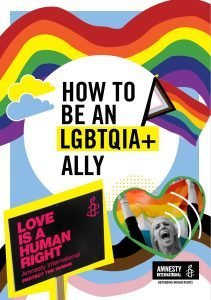The answers revealed
Keep an eye on your phone – we’ll be in touch to send you your LGBTQIA+ ally guide!

This guide presents simple and practical advice for all of us, as we strive to better support the LGBTQIA+ people in our lives and challenge discrimination facing the LGBTQIA+ community. Together, we can help build a safer, kinder and more equal world where human rights are enjoyed by all, regardless of who we love, how we dress or how we identify.
Question 1: Same-sex sexuality in films was automatically censored in Australia up until which decade?
Answer: b. Same-sex sexuality in films was automatically censored in Australia up until the 1970’s. Reforms were made to Australia’s film censorship rules in the 1970s, which brought in a system of classifying films and publications into categories such as G, PG, M and R.
While this meant that queer stories could now be shown on screen, they were classified as R and entry was banned for anyone under eighteen years of age. This conformed to the extremely damaging and untrue claims made by conservative commentators, that information about gay and lesbian life was inherently harmful to children.
Question 2: Decades after the Holocaust, persecution of LGBTQ+ people continued and was not acknowledged. How many men, some of whom were Holocaust survivors, continued to be arrested for same-sex intimacy after the defeat of Nazi-Germany?
Answer: c. Paragraph 175 of the German penal code criminalised sexual relations between men, and it predated the Nazi regime. In 1935, the Nazis revised it to make it broader and harsher and it was one of the main tools they used to persecute gay men and men accused of sexual relations with other men. Under this law, police forces arrested approximately 100,000 men before the war came to an end, of whom around 10-15,000 were sent to concentration camps.
Tragically, after the defeat of the Nazis, gay Holocaust survivors did not leave their camps as recognized victims. Instead, even after liberation, they left as convicted criminals. The Nazi-era amendments to Paragraph 175 were maintained for over two decades in West Germany, resulting in the arrest of around 100,000 gay men between 1945 and 1969, with some Holocaust survivors even being forced to carry out their sentences in prison. While East Germany had softer penalties, no reparations were provided for gay victims, and Paragraph 175 itself would only be entirely removed from the penal code in 1994, following Germany’s reunification.
Question 3: True or False? The most recent Census included a question on Australians’ sexuality.
Answer: b. False. In the 2021 Census, there were no questions about sexuality. The statistics collected in the Census provide crucial insights to inform the vital services that Australians need.
A lack of appropriate questions capturing LGBTIQ+ communities and experiences results in a service gap that constitutes discrimination of the LGBTQIA+ community.
Question 4: In 2023, how many anti-LGBTQ bills seeking to censor school curriculums were filed in the US?
Answer: c. In 2023, 71 anti-LGBTQ bills seeking to censor school curriculums were filed in the US.
Question 5: True or False? The movement for women’s right to vote in the US was strengthened and led by women who defied gender and sexual norms in their everyday lives, such as in the clothes they wore and their romantic partners.
Answer: a. True. The movement for women’s right to vote (suffrage) in the US was strengthened and led by women who defied gender and sexual norms in their everyday lives.
The role of queerness and queer women has been left out of the dominant narrative of women’s suffrage history, or explained away. Suffragists who didn’t conform to the gendered norms of their day were sometimes described as simply “eccentric”, while partners of suffragists were often relegated to the status of “close friend”. This has led to an erasure of queer history.
You are part of a movement defending equality and demanding safety for all.
From all of us at Amnesty, thank you. Your support as an ally is changing lives.